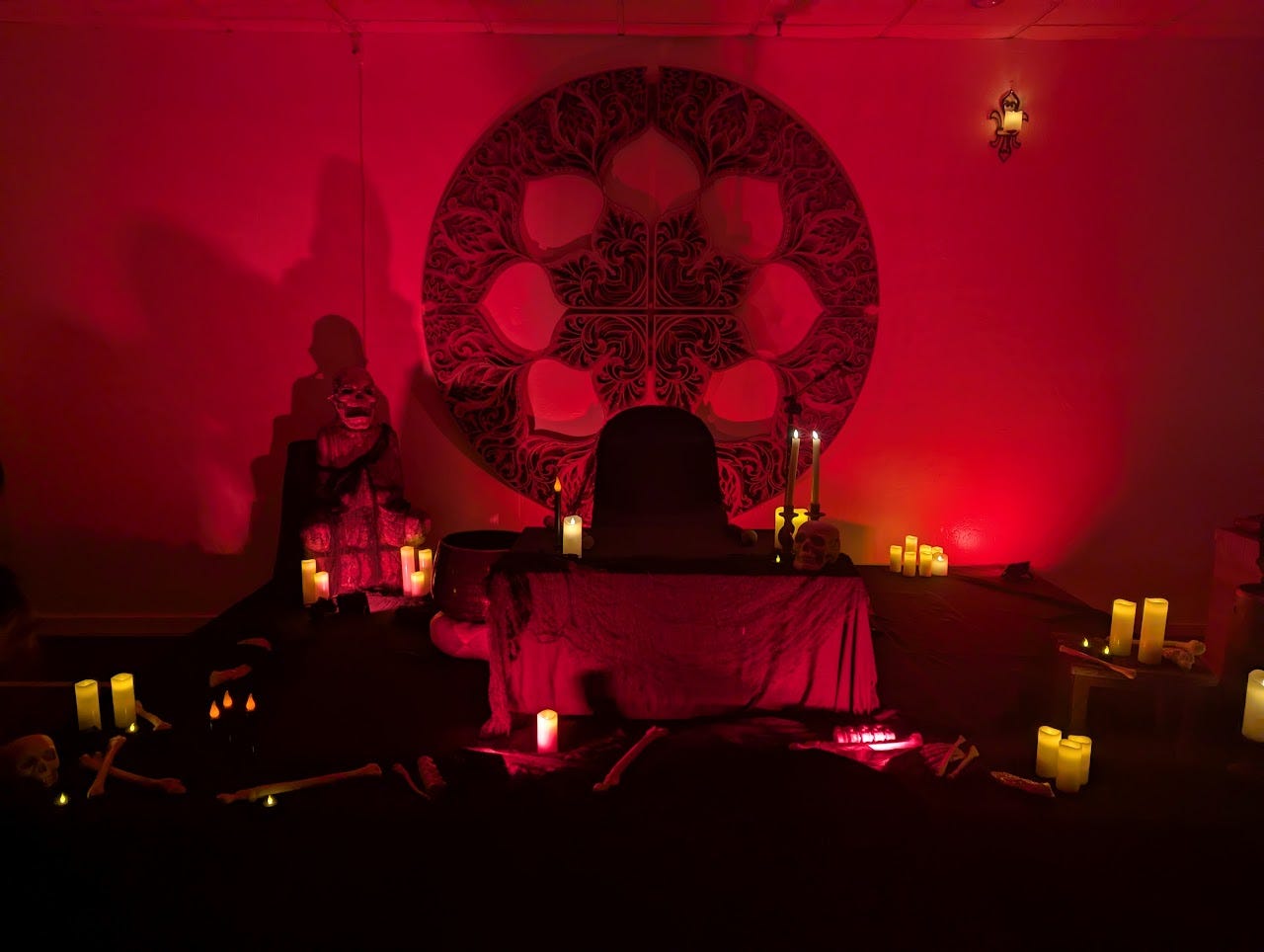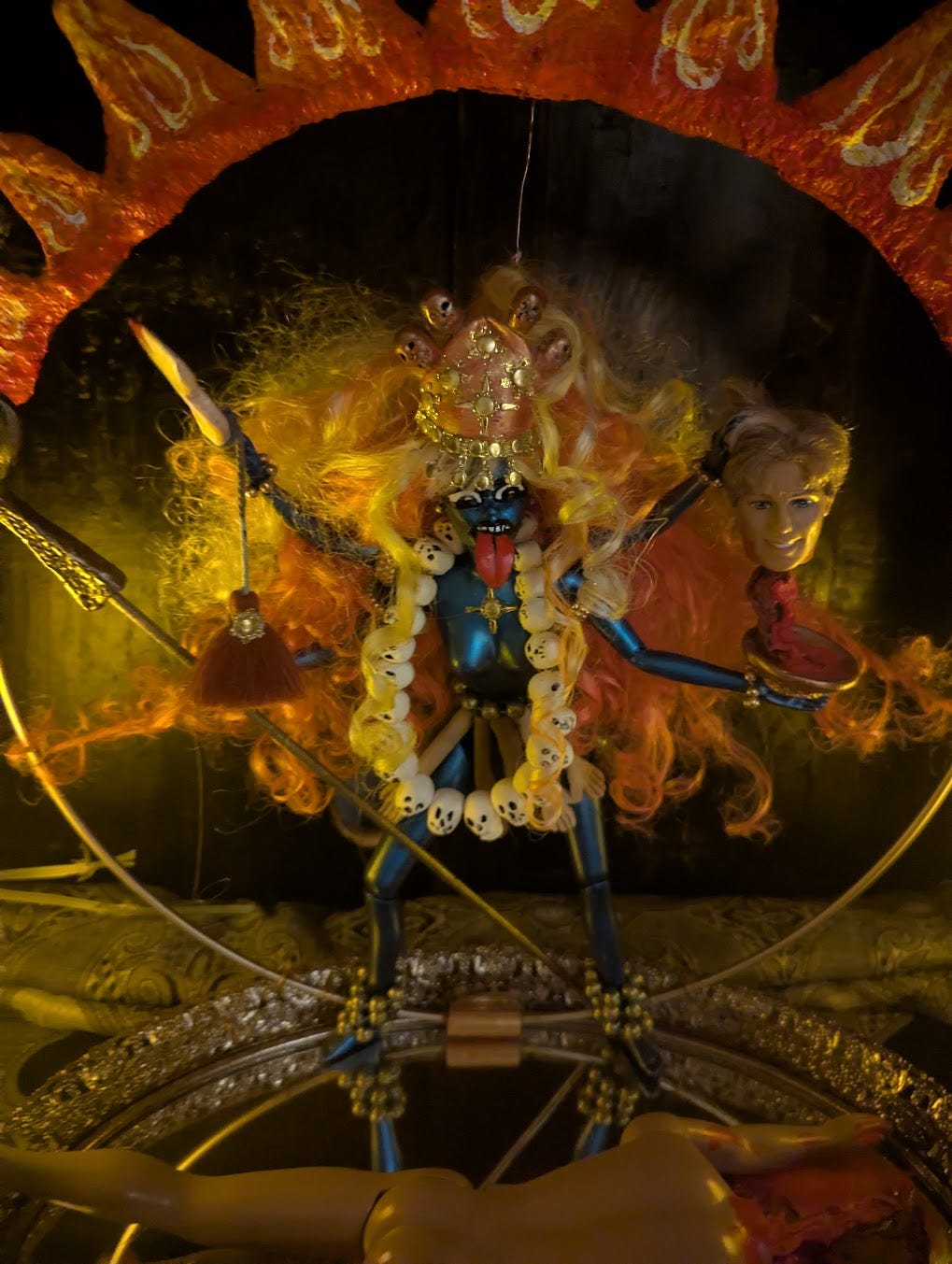Flirtations with Death
Necro-posting an old note from my Medium with some extra explication on the macabre.
Epicurus said, in 300 BC, that death is not a harm, for “When we exist, death is not; and when death exists, we are not.” Since I read it as a teenager, I’ve believed this to be a clear and simple truth. But to believe it, to feel it, and to live it are all different.
My sister and I were raised on the story of my father’s father, bedridden by lung cancer, choosing to pull the plug. We were taught that this was a right and noble choice, to leave this world with honor, by your own will, and surrounded by family. Years later, I watched my mother cry at the death of each of her parents. First, for my grandfather, tears of relief, that his struggle with Parkinson’s and deep depression was over, and his suffering had finally passed. Next, 15 years later, for my grandmother, tears of gratitude, that she was spared a similar fate. 102 with your mind intact is quite the high score!
As a young adult, I attended the joyful celebration that was my great Aunt’s wake. And while I missed her, it was difficult for me to feel grief because unlike so many that make it past 80, she never stopped living. She went to Burning Man, wearing the EL wire bikini she crocheted at age 65. She learned Mandarin in her final years in assisted living, just so she could talk to the man next door. Every time I visited her in San Francisco, she had something new to talk about. “We’ve really got to make it to the stars!”. She once pulled out a box of little paintings she had made, and let my cousin and I pick some out for ourselves, “or they are getting thrown out”. “Wowwww! How many years did it take to paint all of these Aunt Eleanor?”. She laughed at that, “these are all within the last month!”. For her wake, she asked for one thing. “Take all of the people and stick them in a room together so they can meet. If I love them, they’ll love each other”. When an olympic gymnast brilliantly sticks the perfect landing, do you grieve that they are no longer in the air?
Ok, but we all know it feels different when it’s the old. I’m not old, but I have felt death’s eyes over my shoulder more than once. Exhausted, my leash snapped and board gone, the shore invisible in the fog and nobody able to hear my shouting over the beautiful thundering of the pacific waves. As I swam and treaded and tried to conserve energy at the edge of my ability, I thought, softly, “well, this is how it actually happens. A new surfer, who doesn’t know their own limits yet meets a bit of bad luck. This might be all she wrote.”. Maybe it was the physical exertion, but there was no room in those minutes for fear. Only a simple thought followed. “I hope my friends aren’t too sad.” About a minute later, my feet touched sand. “Not today I guess”.
Just this year, I talked to a close friend on the phone after another close call, and a call to 911. The call was casual. We chatted about life first. And then, at some point “Hey, I’m glad you didn’t kill yourself. It would be kind of a shame to walk out early, you know? We wouldn’t get to see the ending.” My friend laughs, “Yea, I know”. Back to chatting.
All of these quiet moments, these flirtations with death, have made me feel that the grim reaper isn’t a monster. Nor is death some ancient enemy that I hope to someday conquer. Death is an old friend. Agree or disagree, but all I know is that if I die unexpectedly and you survive me, please try to take comfort in the fact that I died doing what I loved: living. And if I am blessed with a long life and I feel death draw near, I won’t flee or look away. Instead, I will hurl myself straight into death’s open arms, joyfully, of my own will, cackling as I go.
Fear and Death
It is an oft-repeated truism that all religion, all fear, and all philosophy is a struggle to reconcile our own mortality. Ernest Becker argues in his 1973 Pulitzer-prize-winning The Denial of Death1, that much of human hubris and atrocity stems from the suppression of our ever-present, innate, fear of death. If the body cannot live forever, then perhaps our lineage, our nation, or our egos. Since the pharaohs, powerful men seem to inevitably develop, with age, the desire to leaving a smoking crater, a mark of some kind, in the pages of history. Today’s billionaires are getting more and more on the nose, preferring investments in longevity projects to pyramids. Is this a positive development? Perhaps it will alleviate some suffering, but I don’t know if us living longer is good for the species and the Earth in the long run. (can you tell that I’m jaded from working in the medical industry?)

Our culture is fairly bad at this as cultures go. We don’t talk about death very much, and when we do talk about the dead, it’s from a place of either distance, or hushed vulnerability behind closed doors. Ken McLeod, a Tibetan translator and Buddhist teacher of note, recounts2:
Death is not a popular topic. Shortly after completing my first three-year retreat training, I had dinner with a group of people, one of whom was a psychologist. Curious about my experience, he asked what I had studied in retreat. I replied that 90 percent of the curriculum had to do with learning how to die. All conversation stopped.
In many times of antiquity, it was much more normal to have the bones of deceased loved ones lying around, to be used both practically and as ritual objects. However, in my own upbringing in modern America, I think I may have not even seen a human skeleton in person until high school, when I saw the excellent (and of course, controversial) Body Worlds exhibit.
Practice Dying
So, is there another way? In this piece above, which I wrote a few years ago, I open with Epicurus, but note that mere statements about death don’t do much for existential terror. Well, there is another way to transform our relationship with death, rather than soothing with heaven, children, or pyramids. Practice. Just as Socrates advocates that we practice the ongoing death of our ideas, we can repeatedly confront the death of bodies and minds.
All trauma healing works in more or less the same way: bring up the trigger in a manageable dose, and affirm safety. Repeat3. The fundamental fear of death, perhaps (according to Freud) the trauma of when we first learned of our own impermanence, is no different. Engage with death. Get to know it. Make friends with it.
Near-death experiences can have this effect, especially ones which are not followed by grievous bodily injury, but there are lighter forms.
In the Bay Area, there’s the podcast, workshops, and events run by You’re Going to Die, which makes space for engagement with death.
It seems that I see more and more death-based art appearing in the Burning-Man-adjacent immersive art space. VR headsets are being leveraged to deliver near-death-experience simulations.
Group death meditations are a particularly beautiful discovery I’ve made this year. The NY Psychedelic Sangha hosts frequent death-and-rebirth meditations4, and the Alembic hosts a yearly Death Sangha.
Tantra and Death
If the Bay Area-esque VR forays into the macabre are small encampments in the realm of the dead, the capital city is Tantra, with its corresponding Buddhist and Hindu movements. Tantra is fucking metal. Just look at this stuff! One of the most important Tantric Hindu deities is Kali. Her lips are smeared with blood. Her ears are adorned with corpses. She wears a garland of skulls, and holds a severed head in one hand. Bodies are crushed under her feet.
Kali helps tantric practitioners to look death in the face, over and over, until it is accepted. The practice is full of deathly imagery. A syllable in many of the most sacred Buddhist mantras, important for clearing, is “phat!”. This sound is said to be an onomatopoeia of the sound a popping skull makes on a funeral pyre.
Does this imagery feel uncomfortable? If you can notice that, good! That’s the practice working, the band-aid being ripped off. (so long as it’s not so uncomfortable that you re-traumatize) Psychology and Spiritual Practice alike are about relearning our associations and changing our relationships. We associate death with pain. They are not the same. We intuitively believe that we “own” ourselves, and when we die we will have “lost” ourselves. That is nonsense. We believe that things have to last forever to be worth anything. That belief has to change if we want to experience any true meaning, because nothing lasts forever.
Becker, Ernest. 1973. “The Denial of Death.” Xiv 315. https://psycnet.apa.org/record/1976-00780-000.
McLeod, K. (2002). Wake Up To Your Life: Discovering the Buddhist Path of Attention. United Kingdom: HarperCollins.
Pohar R, Argáez C. Acceptance and Commitment Therapy for Post-Traumatic Stress Disorder, Anxiety, and Depression: A Review of Clinical Effectiveness [Internet]. Ottawa (ON): Canadian Agency for Drugs and Technologies in Health; 2017 Aug 28. Available from: https://www.ncbi.nlm.nih.gov/books/NBK525684/
Based on Timothy Leary’s The Psychedelic Experience, which draws comparisons between a psychedelic trip and the Tibetan Book of the Dead.





Thought-provoking and so true - very appreciated!